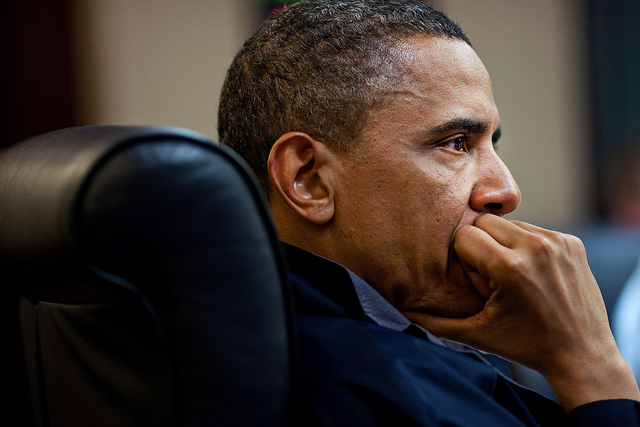
Amid worsening reports on the severity of the fighting in Southern Kordofan and the impact on civilians, President Obama made a statement via audio recording late Tuesday night calling for an immediate ceasefire across a swath of Sudan’s border recently embroiled in fierce fighting.
Addressing the leaders of the governments of northern and southern Sudan, President Obama called for a negotiated solution. “Both sides must agree to end the violence, to allow the free movement of aid workers and relief supplies to help those in need, to fulfill their commitments under the Comprehensive Peace Agreement, and to resolve their differences peacefully.”
President Obama’s message focused on the potential for a solution at talks in Ethiopia. He warned that Sudanese leaders who “flout their international obligations” will face consequences, including halting steps toward normalization of relations with the United States.
On the heels of Secretary Clinton’s recent engagement with Sudanese leaders and the ongoing diplomacy of U.S. special envoy Princeton Lyman, the president’s statement underscored the Obama administration’s high-level attention to what many fear could be a resumption of war between the North and South.
But it also demonstrated a continued reluctance by members of the international community to identify outright which party is most responsible for the ongoing violence. It is a trepidation that has characterized much of the international discourse about the fighting of recent weeks, beginning with the confusion surrounding the provocation of the SAF offensive in Abyei.
The narrative of the SPLA’s initial attack on the convoy of northern soldiers and U.N. peacekeepers set the stage for a more tempered international response when the SAF offensive began in Abyei. President Obama called for an immediate cessation of offensive actions by the Sudan Armed Forces and SAF withdrawal in the case of Abyei, reiterating the standing demand of the U.N. Security Council, U.S. State Department, and White House spokesperson, among others. But beyond this position, there has been no visible attempt by the international community to step it up when statements fail to achieve the desired results.
This cautious approach is evident in the U.N.’s backstepping on whether to use the term “ethnic cleansing” to describe the violence in Abyei. An initial draft of an internal U.N. memo stated that the SAF’s occupation of Abyei was “tantamount to ethnic cleansing,” Foreign Policy reported. However, the final version more conservatively warned that conditions “could lead to ethnic cleansing” if Ngok Dinka were unable to return home.
The tendency to shy away from the reality on the ground has dangerously carried over into the crisis in Southern Kordofan, even amounting to international silence over serious aggressions by the Sudan Armed Forces. Such is the case with this week’s assault on the town of Kauda in Southern Kordofan, where many civilians displaced from the capital have gathered and U.N. peacekeepers have a base. The airstrip in Kauda was reportedly bombed numerous times, rendering it unusable. Sudan expert Eric Reeves explained the significance in an email:
"This runway has no military purpose; its destruction is meant solely to obstruct humanitarian relief. Bombing it is ipso facto a war crime, leave aside the proximity of civilians and peacekeepers." Reeves said that the international community should have anticipated that it would be targeted, given the apparent policy of targeting of civilians and obstructing relief efforts. "It is criminal negligence not to have warned Khartoum in the strongest possible terms against targeting this crucial piece of infrastructure, and yet there is still no outcry," he added.
By all accounts thus far, the northern and southern armies are not equally at fault in the current crisis. Considering the SPLA’s own record, it is likely that forces aligned with the South have committed atrocities as well, and getting verifiable information from Southern Kordofan is next to impossible right now. But what governments and most immediately the U.N. peacekeeping mission do know should be enough to act on, as journalist and author Rebecca Hamilton recently noted.
Instead, there’s an emphasis is on the responsibility of “both sides,” “both parties,” to “live up to their responsibilities” to the Comprehensive Peace Agreement. While President Obama’s own voice lends welcome attention and gravitas, the problematic rhetoric remains the same, misconstruing the nature of the current violence by giving the impression that the northern and southern governments evenly share the blame. As a result, the current debate over what should be done lacks the outrage that the North’s blatant targeting of civilians and humanitarians deserves.
Photo: President Obama (White House flickr photostream)

